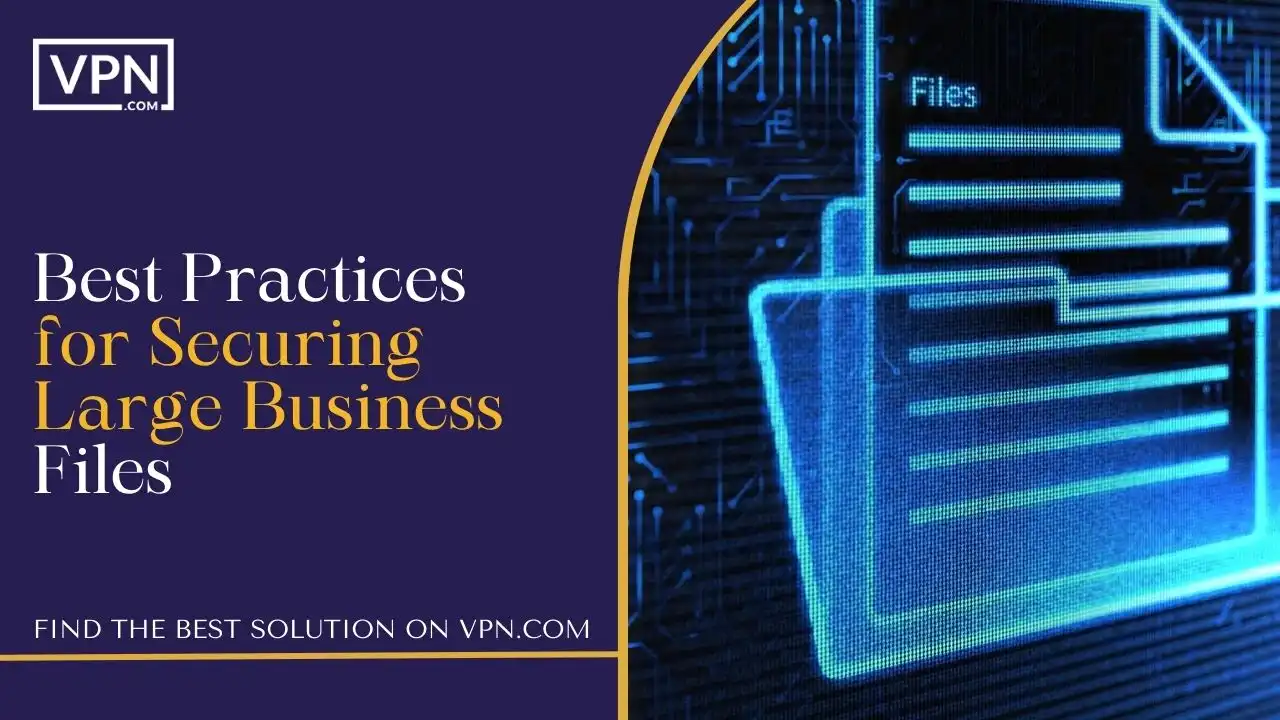5 Best Ways To Securely Share Your Business Big Files

With cybersecurity threats rising, securing and sharing large, sensitive business files is more crucial than ever. The best methods for secure file sharing leverage encryption, access controls, and file compression to keep data safe.
Top techniques for secure file sharing include using client-side encryption services like Tresorit that keep files encrypted until the recipient decrypts them, deploying remote access tools like Citrix ShareFile that allow granular control over file access, sending files through secure email platforms like Virtru that encrypt attachments, transferring files peer-to-peer with blockchain-powered systems like Filen, and compressing files with Zip formats before sending to reduce transfer times and chances of data corruption.
The most secure services for secure file sharing provide zero-knowledge encryption where only the sender and recipient have the keys without the platform storing them. Some also offer remote wipe capabilities to revoke access if files fall into the wrong hands.
With cyberattacks and data leaks accelerating, lockdown file sharing across devices, email, cloud drives, and networks is essential for protecting IP, financial data, customer information, and other sensitive materials. The best approaches allow businesses to collaborate efficiently while keeping proprietary files under lock and key.
Best Practices for Securing Large Business Files

Securing large, sensitive business files is crucial to protecting proprietary information, financial data, customer details, and other critical materials. With rising cyber threats, companies must take proactive steps to safeguard files. The following is an extensive note on the best practices for securing large business files:

Get Started w/ NordVPN Today
- Top-rated VPN for OS unknown
- Ultra-fast speed in US in 2024
- Save 69% off with VPN.com Discount
- Plans starting at $2.99/month
- Rated 4.5/5 on Google Play with over 825,000 reviews
- Rated 4.7/5 on Apple App Store from 6,600 users
Use Encryption
Encryption converts data into coded form so only authorized parties can access it. Encrypt files containing sensitive information, both at rest and in transit between systems. This ensures files remain secured if intercepted. Services like Tresorit provide zero-knowledge encryption where only the sender and recipient have the keys.
Control Access
Implement access controls restricting file availability to only personnel who need it for their role. This follows the principle of least privilege. Tools like Citrix ShareFile allow admins to customize user permissions.
Compress Large Files

Big files strain networks and are more prone to corruption. Compressing with Zip formats before transfers reduces size. This cuts transfer times and boosts reliability.
Train Employees
Human error causes many data breaches. Train staff on your file-sharing system and security policies. Establish proper vs. improper sharing habits. Stress the impact of lapses like exposing customer data.
Support Secure Protocols
Legacy protocols like FTP transmit files unencrypted. Use modern versions like SFTP that leverage SSH encryption and two-factor authentication. Integrate secure transfers with your workflows.
Audit Access and Activity
Log user file interactions so you can trace incidents. Monitoring for suspicious activity lets you rapidly respond to potential threats. Some systems also notify admins about anomalies.
Back-Up Sensitive Data
Maintain file backups you can restore if ransomware encrypts your files, ensuring secure file sharing. Keep regular copies both onsite and cloud-based in case of disruption to corporate systems. Test restoration periodically for secure file sharing practices.
The security best practices reduce the risk of mistakes, data leaks, unauthorized access, and malicious attacks that lead to legal, financial, and reputational damages.
How Enterprises Can Efficiently Transfer Large Files?

The following is an extensive note on how enterprises can efficiently transfer large files:
Secure File Sharing in Enterprises
Based on the search results, the best solution for enterprises to efficiently transfer large files is to use a dedicated file transfer platform like Raysync. Raysync adopts advanced file transfer protocol technology that can deliver speeds over 100 times faster than traditional FTP or HTTP methods.
Transfer Acceleration Technology
Raysync features an intelligent data transport architecture that leverages UDP-based transfer, automatic routing selection, and parallel file transfers to maximize bandwidth utilization across global distances. This ensures reliable, high-speed transfers regardless of file size or location.
Scalability
The platform offers unlimited scalability to handle growing transfer loads. It supports over 100,000 concurrent file transfers and easily scales transfer capacity by adding more servers. This future-proofs investment as needs grow.
Reliability
Raysync provides guaranteed file delivery via features like automatic resumes of broken transfers and customizable retransmission strategies. It also offers high availability configurations to eliminate single points of failure.
Security
Enterprises can leverage end-to-end AES-256 encryption, SSL protocols, and granular access controls to secure transfers. Authentication options like LDAP/AD, 2-factor, and SSO integrate with existing systems.
Visibility
Admins gain full visibility into real-time transfer insights like bandwidth utilization, system resource allocation, and transfer logs/reports. This enables monitoring performance and troubleshooting issues related to secure file sharing.
By leveraging Raysync’s accelerated transfer protocol technology, enterprises can achieve fast, reliable, and secure file sharing transfers for even the largest file workloads distributed globally.
Cloud Storage With Restricted Access Permissions

The following is an extensive note on cloud storage with restricted access permissions. There are several options for setting up cloud storage with restricted access permissions:
Cloud Storage Services
Services like Dropbox Business, Google Drive Enterprise, Microsoft OneDrive for Business, Box, etc allow setting editing/viewing restrictions and expiration dates:
- It sets permissions at the user, group, or folder level to control who can view, edit, share, etc.
- The expiration policies can automatically restrict access after a set period
- It integrates with existing company workflows and users
- It provides encryption, access logs, version history
Secure File Transfer Services
Services like WeTransfer, Mimecast, Accellion, Hightail, etc ensure data encryption during transfers:
- Encryption is applied to files in transit and at rest
- Some specialize in large file transfers across teams
- Provide audit trails showing access logs and transfers
- Can set password protection, and expiration dates on transfers
VPN Connections
Encrypted tunnels between office locations allow employees to securely access the company intranet and files:
- It allows remote locations to connect via VPN to the company network
- When it is connected, remote users can directly access files on company servers
- It provides a secure way to access files without exposing them externally
Blockchain Platforms
Decentralized, distributed ledger technology controls access and preserves integrity:
- The encrypted data raw data and chunks stored across decentralized network nodes
- The consensus algorithms validate any changes across all nodes
- It takes control of access with private/public keys and digital signatures
- The integrations growing across industries
Secure FTP Servers
Classic secure standard for batch file transfers with access controls:
- Leverages encrypted FTP protocol for transfers
- It provides useful terms for scheduled, batch transfers
- It controls access with username/passwords
- It provides an on-premise solution with no external exposure
There are many options like cloud storage services, transfer services, VPNs, blockchain platforms, and FTP servers that provide restricted access controls for secure file storage and sharing. The best solution depends on specific business needs and workflows.
Key Benefits Of Using Cloud Storage With Restricted Access

The following are some key benefits of using cloud storage with restricted access permissions include:
Improved security and access controls
Cloud storage services allow setting detailed permissions at the user, group, or folder level to control who can view, edit, share, etc. This is better than having files openly accessible on a shared drive. Expiration policies can also automatically restrict access after a set period.
Centralized management
Cloud storage provides centralized management of users, permissions, and access logs from a single admin console rather than individual systems. This makes it easier to manage security and compliance.
Flexible scaling
Cloud storage can easily scale with a growing business by adding more storage or users without expensive upgrades. This flexibility enables seamless growth.
Availability
Files stored in the cloud are accessible from anywhere with an internet connection and avoid localized failures. This improves availability and collaboration.
Cost savings
Cloud storage can cost less compared to maintaining on-prem storage infrastructure and IT staff. The pay-as-you-go model saves money. After discussing all of the features and advantages of using best practices for secure file sharing and sharing business big files, we have found there are several flaws as well.
The basic drawbacks consist of a lack of control completely, vendor lock-in, and public cloud security concerns, including secure file sharing, that should also be taken into notice. Overall, the advantages showed to represent the limitations for most use cases.

Get Started w/ NordVPN Today
- Top-rated VPN for OS unknown
- Ultra-fast speed in US in 2024
- Save 69% off with VPN.com Discount
- Plans starting at $2.99/month
- Rated 4.5/5 on Google Play with over 825,000 reviews
- Rated 4.7/5 on Apple App Store from 6,600 users
Conclusion
Cloud storage services are a combination of flexibility and cost-effective solutions for businesses needing to store and share files securely. There are several key services like Dropbox, Google Drive, Microsoft OneDrive, and Box for secure file sharing. These top-notch services allow setting permissions at the user, group, or folder level to restrict viewing, editing, sharing, and access, ensuring secure file sharing.
These services include the management of users and access logs through a single admin console. Expiration policies can take control to automatically revoke access after a defined period. For sharing large files securely, dedicated services with high-quality, like WeTransfer, Mimecast, and Hightail, provide encrypted transfers and options like passwords and expiration dates, enhancing secure file sharing. To ensure secure remote access to company files,
VPN connections can be established between office locations. This allows remote employees to access the company intranet without exposing files externally. Decentralized blockchain platforms provide another emerging option through encrypted storage across distributed network nodes, with consensus algorithms validating any access or changes. While blockchain is still maturing, growth is accelerating across industries. Finally, classic secure FTP servers allow batch transfers leveraging encrypted protocols and access controls.
In summary, there is a multifaceted ecosystem of technologies purpose-built for securely storing and accessing files with strict need-to-know access. The optimum solution depends on the specific workflows, cost, and collaboration requirements of an organization. If you have any queries in mind feel free to contact us!
Customer Reviews for NordVPN: In-Depth Review, Tests, and Stats

Connection issues with MLB.TV
May, 2 2023

Prompt customer service
May, 6 2023

I would highly recommend
December, 15 2023



